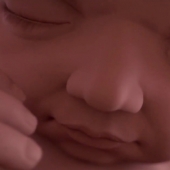Many new mothers have postpartum blues, but some women suffer a more serious condition, postpartum depression. Dr. Keith Eddleman, who is head of obstetrics at Mt. Sinai Hospital in New York, has vital information about these conditions and how they're treated.
There are two forms of postpartum depression. The first form is postpartum or maternity blues, which is a mild mood condition that lasts for a short time. A more severe form, called postpartum major depression, is a serious, potentially life-threatening condition.
How to cope with postpartum blues or depression:
Bringing home a newborn baby is supposed to be one of the happiest times of your life. But what if you are feeling everything but happy—is this normal?
- Know that postpartum blues are very, very common. 80% of all women experience some form of a mood disorder in the postpartum period.
- Symptoms are vague, but can include extreme fatigue, feeling tearful for no known reason, and a disinterest in caring for your newborn baby.
- Get help by acknowledging the symptoms, talking to friends and family, and securing some extra help so that you can have a few hours of much needed “me” time to take care of yourself.
- Postpartum blues generally last for a short amount of time (2-4 weeks) and eventually go away.
- Postpartum depression has more severe symptoms including: panic attacks, anxiety, insomnia, hypersomnia (sleeping all the time), not eating, or feelings of harming yourself or your baby.
- Seek medical help and call your doctor if: symptoms last more than 2-4 weeks, you have thoughts of injuring yourself or your baby, or you are unable to carry on with normal daily activities.
- Most women don’t need medication for postpartum blues.
- Postpartum depression sometimes requires medication, but it often goes away on its own. It’s not a permanent condition.
- 45 views













